Last Friday, 23-year old Joseph Wong shared on Facebook about an experience from 7 years ago when, as an N Level scholar with autism, he wasn’t allowed to represent his ambitions accurately to the media. I recently reached out to Joseph for his thoughts on the incident, and have reproduced here our full interview.
It’s lengthy, but it’s also worth your time if you’re interested in what he thinks of success and our attitudes towards life. This also accompanies an op-ed I wrote on how there needs to be a fundamental shift in our we think of and interact with the disabled.
After Monty Oum passed away, I decided to move on from the arts. I found my passion in art was in the end really an immense amount of respect I had for the man. I’m always open to going back to be in the game industry as it has a special place in my heart.
These days I work as a freelancer but much of my time has been dedicated to e-commerce.
Is there anything else that you’ve thought of doing? Are there things you think the world needs that hasn’t really been made or done before?
I have thought about many things, there are a lot of things I do love to do right now. I’m doing a lot of photography and e-commerce but I also have a strong interest in maritime related industries. I believe our world is far from Perfect, there’s a lot missing, but yet unattainable realistically at this point.
Between that incident 7 years ago that you mentioned in your post and today, what are some of the challenges you’ve faced when it comes to living life on your own terms?
The biggest barrier to me, was my ability to sustain myself in a social environment. I’ve learned to work with people, travel on my own and live my life independently of help but this is only true to an extent. I don’t sustain myself very well when I’m consistently around people. Today I spend my work days alone but it doesn’t mean I’m isolated from working with others. I’m in contact with relevant SMEs and partners whenever I need an extra hand or their expertise to complete a task at hand. The internet is amazing and we can get a lot done without even meeting in person!
Can you tell me a little bit about why you “suddenly” decided to talk openly about this issue? What were you hoping would be the outcome?
This post was originally dedicated to a group of parents in an autistic facebook group, the post was part of my response to talk to these parents out of sheltering their children from reality. Reality isn’t that forgiving, I brought up my own case study as an example to these parents about the rude shock I received expecting things to go my way because I worked for it.
The world isn’t fair and many who worked the part never get their say in things. I didn’t want these parents to go about giving in to their kids all the time, telling them everything is perfect and everyone will accept them because it simply is not. Now this is not to generalize all autistic parents, this were a small group of parents who had been supporting each other to go against the psychologist’s word in regards to their children’s early education.
To put the whole saga simply, I figured to post in on my personal facebook as well on a whim as I commonly do although I did not expect such a huge number to see it.
It’s really interesting that a lot of what you’ve said here seems to be things that apply not just to disabled individuals, but to all of us as well. You mentioned that you’ve learnt to be independent with much difficulty, but what has kept you going? Was it the knowledge that one day you might not have anyone to depend on but yourself, or was it something else? Do you think this is something these parents need to realise as well, that they won’t be around to shelter their kids forever?
The goal post has shifted considerably, initially it was about me just wanting to be normal. As I became more capable in studying and being stable in school, I wanted to do more. I have to thank my Maths Teacher for that. Mdm Chang gave me bitter medicine and it only pushed me harder to better myself. Handwriting was a big problem, with motor skill problems it was hard for me to write properly. After my scholarship my next goal was to overcome my motor problems by practicing drawing. Goals keep changing and I keep chasing them.
As for parents, I believe they should always do their best to prepare their children to fend for themselves, reality isn’t nice but I understand some disabilities are so severe their children maybe dependent for life. Parents will also need to prepare for that as a worst case scenario and make arrangements.
You mentioned that this post was something you shared in a “autistic Facebook group”. Are you open to sharing with me some of the things that are commonly discussed in this group?
It’s just like any other facebook group where parents share their experiences parenting their autistic child. Celebrating birthdays, achievements or simply looking for morale support and advice.
Where have your parents been through all this? You mentioned they were happy for you back then, but have they become more understanding towards what your experience really is?
They were and still are very proud of my achievement. I would say there is enough understanding in our family. It’s definitely better than before.
On the topic of parents, we talked a little bit about parents’ expectations of their children who face disabilities. Do you think that parents of disabled children should manage their expectations?
This is rather subjective, people with disabilities vary in severity, some are so severe it becomes clear they would not be able to function independently. But rather than having expectations, I would suggest parents to have faith. To believe in the possibility that
their child can do better and work with their strengths. You never know how far they can go even if it seems hopeless.
Tim Harris has down syndrome but yet he runs a his own restaurant. It’s painful to hope, because when you hope it becomes an expectation.
“Hope is the first step on the road of disappointment.” —Isador Akios (Warhammer40k)
Instead have faith, believe in the possibility but do not expect the best.
Do you think that individuals who are disabled should be pitied or used as “inspirational stories”?
I believe pity is a natural response people may have to someone less fortunate but the person who is disabled should never take pity as a form of entitlement for aid. Never mistake pity for kindness and never demand pity. Its subjective, to me it’s a natural thing.
I was speaking to a victim of human trafficking 2 years ago. I did feel very sorry for what she went through. I don’t think its evil to feel pity for someone sometimes fortune is relative too. I pity celebrities who have been misrepresented even if they are at a standing way higher than anything I have faith in myself to do.
Disabilities may be a catalyst for inspiration and stories I see no harm in adapting such into narrative. Anything can be used for inspiration really, it’s a natural thing to marvel at someone climbing to the top against all odds.
Why do you feel this way?
I just feel it’s the natural way of things. We see it around us throughout our lifetime. We pity people not because they are disabled, we pity them because they don’t have control over their situation due to circumstances. All these circumstances, disability, a lack of money, starvation. Is a loss of control. And because they don’t have control over their circumstances they are in the difficult position to achieve what an average person has the capability of. I believe that is why we pity people, something in us finds their predicament relatable and it makes us sad.
Inspirational Stories are timeless, non fictional accounts of brave men who fought overwhelming odds, a navy diver who lost his legs but still became a master diver. It’s something people like to hear, it empowers others, makes them feel they can do better. Disabilities are a catalyst both in fiction and non fiction and one of the many ways to start such a story I don’t see any reason against not using them.
I’m just going to play the devil’s advocate here. Do you believe that using disabled individuals to inspire able-bodied people is genuinely dignified? After all, accepting that it’s natural doesn’t necessarily make it okay, and we’ve also talked a bit about how many who are disabled just want to be seen as and accepted as normal. Yet if they’re constantly held to these ideas of having to excel beyond their situation in order that they may inspire others, does this not take away their agency?
Disability is a problematic circumstance, everyone has a barrier that prevents them from doing what they want to do. People find inspiration in many types of stories aside from disabilities all of which resonates with different people. During my teens being accepted as normal was something I desired but as years went by I realised it was not a possibility.
You can’t stop people from seeing you differently and culture has been shaped to glorify people who have made it against the odds. It’s been in our literature since the ancient times. People will always know you are different, the most important thing is that they treat you in a non-discriminating way in all fairness. That’s as close as it gets and its good enough for me.
Your responses to these questions have been extremely balanced so far. I’m just wondering if you think it’s important to always understand both sides of a story?
Yes, I believe in seeing both sides and seeing why they made such stands. Most of the time both parties have their own fair justifications for their own views and I respect that and I do not wish to change it. There are many factors to why someone made their decision, to come to this conclusion which they have justified and understood. As outrageous as some views may be I respect their choices unless it does me direct harm.
I also noticed that you keep mentioning that you don’t blame anyone, or that everyone should share the blame.
There are times I do believe someone is or can be entirely blamed for a situation. That’s not the case in this scenario and I recognize everyone’s fault in the matter. In this scenario I still see myself as a victim but more of a victim of my own lack of maturity at that time to abstain. I’ve been a victim of circumstances a few times in my work but we got to move on. Reality isn’t forgiving to people who are victims. Victims need to grasp control of their situation and become stronger, not looking for pity or help at every given turn. Of course I am aware that there are many circumstances victims can’t move on from or can’t be in control of and that’s terrifying, I’ve felt it myself and its perfect psychological horror which has been used in many horror games.
How would you say that autism has affected your life? Do you think it’s a big deal?
It’s a big deal, I think about it and how much more I could do without it. I tend to think about it at night. If I could spend that time I learn figuring how to interact with people, to do the most basic things such as getting dressed right or navigating around properly.
I would have probably got my life straight a lot faster. Many say autism is a gift and while some autistics did get more of the good than the bad such as autistic savants, the majority of us aren’t that gifted and we spend years learning things neuro-typicals would naturally know instinctively or grasp without much effort. I know I can’t change the past but I always think what if. What kind of person I could be if I was normal.
Would you like to elaborate a little bit more on the challenges that individuals in your position face?
I can’t really say for others given everybody has their own circumstances but as for myself I faced an urgent problems. The need to be independent in my daily life. Navigating, coping with poor motor skills, managing my work life balance are part of the smaller spectrum of problems I faced as part of my need to be independent. I’m sure there are others who face this and I have to say you can’t overcome everything. If you are built in a certain way, you will have limits somewhere. You just need to arrange your life in a way you can handle. I was able to overcome much of my problems with orientation and I don’t get into accidents often anymore but poor motor skills still lingers. This is also one of the smaller reasons I decided against dedicating my life to game design. Poor motor skills means that I don’t have very good control of my hands I tend to make a huge mess for hours before I can get something on paper. It was doable but tiring and I couldn’t really see myself dealing with this problem for the rest of my career. But technology is improving, there are softwares and equipment design to help people like me perform in that field again.
Where do you think you would be or who do you think you would be if you had not been born with autism?
My life would be extremely different. Without autism, I would have probably been a palaeontologist, my shift to arts was triggered by a Swiss friend Dominik Burkhard who introduced me to my fascination in the German language which in turn led me to making friends which an amateur VFX artist Emily I would have probably went through school fairly smoothly and trained myself to qualify academically and physically to join the excavations of prehistoric life.
In Singapore we tend to have quite a narrow idea of what ‘success’ is or looks like. Do you think this needs to change?
Singapore is indeed a conservative society, it really depends on the people. I believe it needs and will change depending on the new generation. The millennials do not share the traditional views as much as the older generation. They are more open to definitions of success not traditionally defined by our culture. If it doesn’t change with the changes in our people and culture, it is an indicator of problems within our society and I believe our generation must actively do our part together to create a Singapore where we can define our new terms of success and celebrate it and not repress these concepts and be miserable.
If you could say something right now to that teacher from 7 years ago, what would you say?
I don’t know but I guess I’ll have to thank her for making me a wiser person. I hate the position I was in but I never blamed it on her. This was the first time our school had a N level Scholar. To be honest I’m not even sure if her intervention was her own decision or instructions by a higher authority given to her to carry out. I don’t know her side of things and I can only get mad at the school for handling it that way but I can’t blame the teachers. I understand their logic though, with all those scholars talking about law school, medicine or the finance industry. A game developer for a top scholar is anti climatic at least in Singapore. I think we all had a part to be blame here.
How do you feel about the media these days?
Media outlets cater to a particular audience people listen to a particular outlet for 3 reasons in my opinion.
- The outlet uses the language they are most comfortable with
- The outlet affirms their own personal perspective of things most frequently
- The outlet is trustworthy
The third point being the lowest priority, and I would say this is true for most people.
Media needs to provide news in a certain way to their audience to keep and retain that audience. It’s their livelihood I don’t blame them. There’s no real way you can stop people from changing the effects of your intended message unless you publish it yourself and people hear it from you and make their own calls and judgement. I just hope when people look at the news and if it’s very important for them to know it’s true they should go to the source and hear/read from the person to which the news comes from.
But I do feel that media outlets also don’t tend to do enough research on the source. And you see that in the gaming community which is today riddled with game journalists who do not actually understand gaming culture.
Traditional Media, online news sites need to understand what they are reviewing lest they embarrass themselves or perhaps worse lose their livelihood to Youtubers. I honestly don’t think there’s a way to stop news sites from being poorly informed about the situation they are reporting unless laws are made to regulate such but all the journalist who have researched well and understood the story they are covering, we can’t be any more grateful. We can only hope they will continue to cover stories faithfully.






